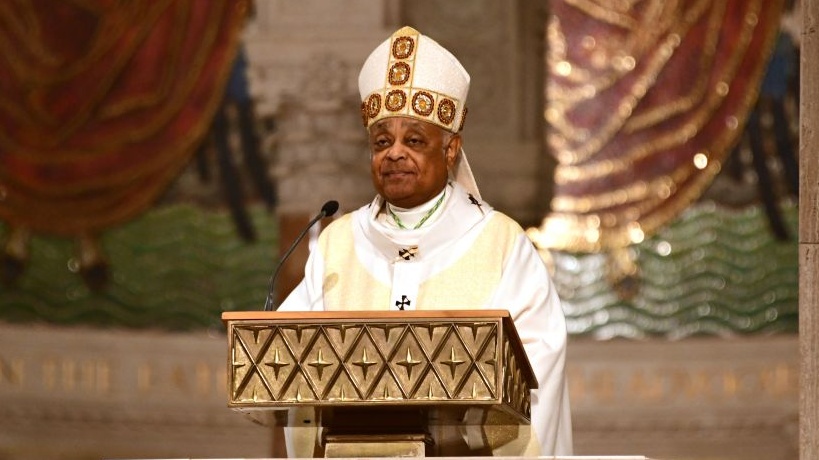Pope Francis announced on Sunday that he has appointed Wilton Gregory, archbishop of Washington, as the country's first Black cardinal, according to CBS News.
Wilton is also the first Black person to serve as archbishop of Washington D.C. and was the only Black archbishop in the country. He helped the church navigate the aftermath of dozens of child sex abuse scandals in the early 2000s as president of the U.S. Conference of Catholic Bishops, CNN reported.
“With a very grateful and humble heart, I thank Pope Francis for this appointment which will allow me to work more closely with him in caring for Christ’s Church,” Gregory said in a statement to The New York Times.
Pope Francis made the announcement after giving the Angelus prayer at St. Peter's Square in Vatican City. Gregory is part of a group of 13 other archbishops, hailing from countries like Rwanda, the Philippines and Brunei, who will be promoted to the position of cardinal.
In a statement to CBS News, president of the United States Conference of Catholic Bishops and archbishop José Gomez said Gregory's appointment sent "a powerful message of hope and inclusion to the Church in the United States."
Gregory is well known for his progressive views and demands that the church do more to include marginalized people, who traditionally were barred from Catholic church leadership positions, according to The New York Times.
CBS News reported that the 72-year-old Gregory has been a fierce advocate for the LGBTQ+ community to be included in the Catholic Church community and has demanded the government do more for immigration reform. He also helped spearhead a climate change plan for the Catholic Church.
The Chicago native has been at the forefront of pushing the church to connect more with Black people, particularly Black Americans, and is part of a larger effort by Pope Francis to modernize the views and membership of the church. Gregory told a mass in August that the church had to be involved in improving race relations and said “men and women, young and old, people of every racial and ethnic background are needed in this effort.”
“We are at a pivotal juncture in our country’s struggle for racial justice and national harmony,” he told the mass during a commemoration of the anniversary of the March on Washington, according to The New York Times.
Gregory served as the leader of Atlanta's Archdiocese starting in 2005 before taking over as archbishop of Washington in 2019 for Cardinal Donald Wuerl.
The New York Times reported that Wuerl resigned in 2018 after being named in a Pennsylvania grand jury report that said he covered for more than 300 priests accused of sexually abusing and assaulting at least 1,000 children over decades.
Gregory was integral in working with federal authorities to implement dozens of reforms to the country's Catholic churches following decades of sexual abuse scandals.
This summer, during the widespread protests over police killings, Gregory made waves in Washington D.C. after bashing President Donald Trump for his now-infamous photo shoot in front of St. John's Episcopal Church, which is across from the White House.
"I find it baffling and reprehensible that any Catholic facility would allow itself to be so egregiously misused and manipulated in a fashion that violates our religious principles, which call us to defend the rights of all people even those with whom we might disagree," Gregory said in a statement released after Trump had soldiers tear gas protesters so he could take a photo of himself holding a bible in front of the church.
He went on to say that Pope John Paul II, who has a shrine in the city that was visited by Trump, “certainly would not condone the use of tear gas and other deterrents to silence, scatter or intimidate them for a photo opportunity in front of a place of worship and peace.”
Gregory and the other men chosen for the position will have an official ceremony on November 28, according to The Vatican, but it is unclear how the event will be held considering the coronavirus pandemic.
Experts who spoke with The New York Times said the church had long had issues with diversity in its ranks. The U.S. Conference of Catholic Bishops told the newspaper that just 250 of the nearly 37,000 Catholic priests in the country are Black, and outside of the diocese led by Gregory, there is only one other led by a Black person.
Shannen Dee Williams, assistant professor of history at Villanova University, told the New York Times that Black people were historically left out of seminaries and religious orders while also being denied leadership positions, even at churches with majority Black congregations.
“The significance of his role as the first Black Archbishop, now Cardinal, of Washington D.C., which was the center of power of the U.S. church’s slaveholding elite, also cannot be overstated. His presence, voice and advocacy against racism as a ‘pro-life’ issue in the Church is needed now more than ever,” Williams said.
